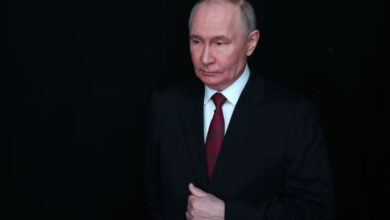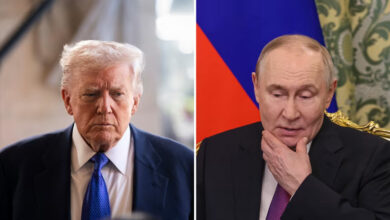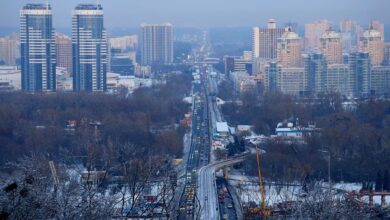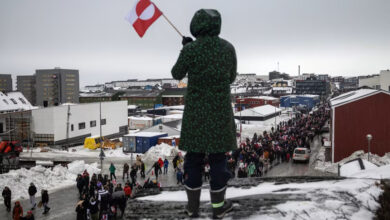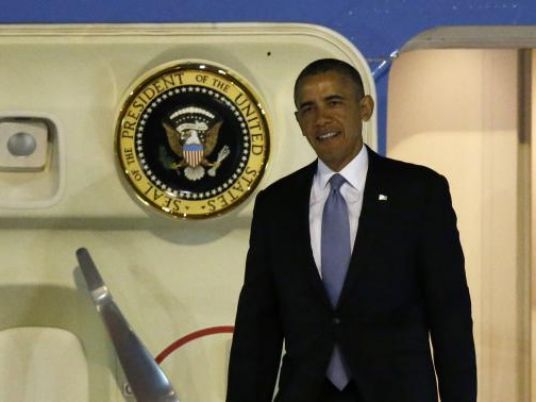
US President Barack Obama announced new sanctions against some Russians on Monday to stop President Vladimir Putin from fomenting the rebellion in eastern Ukraine, but said he was holding broader measures against Russia's economy "in reserve".
On the ground, pro-Moscow rebels showed no sign of curbing their uprising, seizing public buildings in another town in the east. Interfax news agency reported that the mayor of a further major eastern city, Kharkiv, had been shot and was undergoing an operation. It gave no details of the shooting.
Germany demanded Russia act to help secure the release of seven unarmed European military monitors, including four Germans, who have been held by the rebels since Friday.
The new US sanctions, to be outlined in detail later on Monday, will add more people and firms to a list announced last month of figures whose assets are frozen and who are denied visas to travel to the United States.
The European Union is also expected to add targets to its Russia sanctions list on Monday. Ambassadors from the 28 EU states met in Brussels and an EU diplomat said they were expected to add around 15 new names.
Washington will also target some high tech exports, Obama said. But the measures do not yet include the wider sanctions, such as curbs on the Russian financial and energy sectors, that would do the most serious damage to Russia's economy.
"We are keeping in reserve additional steps that we could take should the situation escalate further," Obama said, acknowledging that he did not know if the measures he has ordered so far will work.
US officials have said the new list would include Putin's "cronies" in the hope of changing his behavior.
"The goal is not to go after Mr. Putin personally. The goal is to change his calculus with respect to how the current actions that he's engaging in Ukraine could have an adverse impact on the Russian economy over the long haul," Obama said in Manila during a trip to Asia.
"To encourage him to actually walk the walk and not just talk the talk when it comes to diplomatically resolving the crisis in Ukraine."
Nevertheless, such measures have done nothing so far to deter Putin, who overturned decades of post-Cold War diplomacy last month to seize and annex Ukraine's Crimea peninsula and has since massed tens of thousands of troops on the frontier. He acted after Ukraine's pro-Russian president was ousted in February by protesters demanding closer links with Europe.
Moscow has in the past shrugged off targeted sanctions like those Obama announced on Monday as pointless.
Washington says armed rebels – who have captured towns and government buildings across eastern Ukraine – are operating under the direction of Kremlin agents.
Russia denies it is involved and says the uprising is a spontaneous response to oppression of Russian speakers by Kiev.
Rebels take town
The rebels took another town on Monday morning, seizing the police headquarters and municipal administration building in Kostyantynivka, an industrial city in the eastern Donetsk region. Separatists in the province have proclaimed an independent "People's Republic of Donetsk".
A Reuters photographer at the scene saw about 20 gunmen controlling the administration building.
The Interfax news agency quoted a spokeswoman for the mayor of Kharkiv, another large city in the east, as saying he was undergoing an operation for a gunshot wound in the back. It said no further details of the incident were available.
On Sunday the separatists paraded eight unarmed European military monitors before journalists. One, a Swede who is diabetic, was freed for medical reasons but four Germans, a Czech, a Dane and a Pole are still being held, described by the rebel leader as "prisoners of war" and NATO spies.
German Chancellor Angela Merkel's spokesman Steffen Siebert said they were held "against the law and without justification".
"We ask the Russian government to act publicly and internally for their release, to distance itself clearly from such acts and to use its influence on pro-Russian perpetrators and forces in eastern Ukraine to secure their release."
Armed rebels also occupied Donetsk television on Sunday and ordered it to start broadcasting Russian state TV.
Obama is under pressure from opposition Republicans at home to move faster on sanctions. But in taking what he described as "calibrated steps", he has emphasized the need to act in concert with European countries, which have more at stake economically and a more cumbersome process for taking decisions.
The EU does more than 10 times as much trade with Russia as the United States and buys a quarter of its natural gas from Moscow. Most EU decisions require unanimity among member states.
Western countries say the targeted sanctions are already having an effect on Russia by scaring investors into pulling out capital. The central bank has been forced to hike interest rates to prop up the ruble and Russian firms are finding it more difficult and costly to raise funds.
Russian shares dropped on anticipation of the impact of new sanctions. The ruble-denominated MICEX index was down 1.3 percent early on Monday. The cost of insuring Russia's debt against default rose to its highest level since November 2011.
Monday's sanctions build on those imposed over Crimea last month, which were deliberately designed to punish individuals close to Putin without having wider impact on Russia's economy or its trade with the West.
The new sanctions could still have a greater impact by widening the net to include personal transactions by the heads of big Russian companies, and the prospect of sectoral sanctions continues to hover over Russian business more generally.
"The heads of Rosneft and Gazprom are rumored to be on the list of targets," Uralsib bank analysts wrote in a morning note, referring to Russia's two biggest firms, its state oil major and natural gas export monopoly.
"Entire sectors of the economy could be targeted as well. Further sanctions for the energy and banking sectors could continue to harm sentiment if announced this week," they wrote, while adding that it was impossible to assess the impact until measures were announced.

